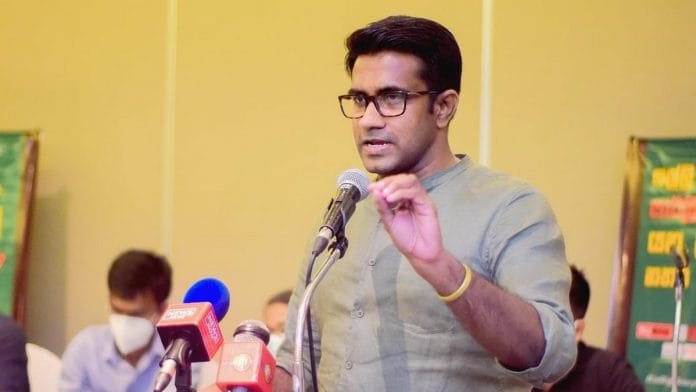New Delhi: The convenor of an up-and-coming Sri Lankan political collective that espouses liberal ideals has found an unexpected source of inspiration across the Palk Strait: the Hindu nationalist Rashtriya Swayamsevak Sangh (RSS).
Called NextGenSL, the Sri Lankan cross-party youth initiative is hoping to plant its roots and become a permanent organisation so as to better advocate for corruption-free politics.
This is where the RSS provides a useful blueprint of how to build a strong and cohesive organisation, according to NextGenSL co-convenor Rasika Jayakody.
“It is not about espousing the same values and objectives as the RSS, but it is about taking notes on how the RSS has been disciplined in building a long-lasting organisation. It’s impressive,” Jayakody told ThePrint.
“NextGenSL has very different objectives to that of the RSS. NextGenSL is about encouraging young people interested in politics to approach governance in a corruption-free way. Our values espouse liberalism, and we are an initiative with members from all political ideologies,” he added.
Also Read: Sri Lanka gets IMF’s provisional nod for $2.9bn loan. Tax reforms, social spend hike part of plan
What is NextGenSL?
NextGenSL was launched in November 2018 as a youth political platform to help solve Sri Lanka’s problems.
The two co-convenors are former journalist Rasika Jayakody, who is now also convenor of an initiative called Liberal Democratic Movement, and Milinda Rajapaksha, currently additional director general of the Department of Government Information and a former member of the Colombo Municipal Council from Sri Lanka Podujana Peramuna, the party founded by former prime minister Mahinda Rajapaksa.
The six other core members, too, represent political ideologies ranging from liberalism and social democracy, to conservatism and communism.
The informally structured outfit hopes to become a permanent fixture in Sri Lanka, where a controversial political establishment perpetuated an economic crisis that the country is still reeling from.
“Our objective is to advocate for law reforms, more accountability and transparency in how Sri Lanka is governed. We advocate for stricter laws in financing for election campaigning and candidates’ asset declaration, and also respond to election-related misinformation,” Jayakody said.
Towards becoming robust like RSS
Currently, NextGenSL does not have a permanent membership base or recruitment process. It currently runs workshops or events through funding received from donors.
For instance, in March last year, it organised an event promoting women in politics conducted with aid from the Germany-headquartered Friedrich Naumann Foundation For Freedom. Previous events have been held with aid from the Washington DC-based International Republican Institute.
“We come together whenever there is a need to organise events, workshops, or to brief the press, when critical issues that must be addressed come up. So, we are still more of a collective of like-minded individuals than a full-fledged organisation. We hope to grow the NextGenSL initiative into something long lasting that can influence the political culture of Sri Lanka,” Jayakody said.
To do this, NextGenSL would typically have to become a registered organisation with formal processes and systems set up to attract and educate more young political activists interested in changing how politics play out in the country.
It is to this end that Jayakody finds RSS noteworthy.
“For any young initiative that hopes to become a lasting organisation, the way the RSS has been built and administrated offers important lessons in what is required to build an organisation,” Jayakody said.
“The RSS has been successful in setting up processes in educating its members and instilling RSS values, in creating a culture and set of traditions that will then be adopted by its members and be carried out into society,” he added.
(Edited by Asavari Singh)
Also Read: Month after meeting Muslim intellectuals, Bhagwat makes 1st mosque visit, meets imam body chief






